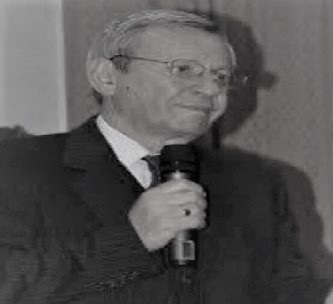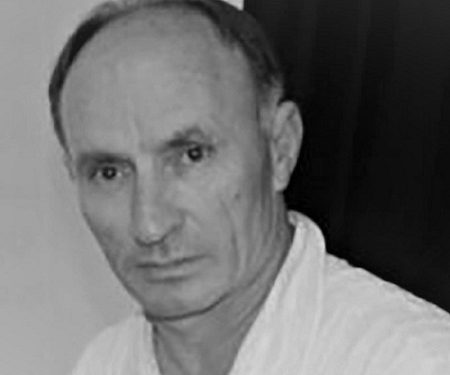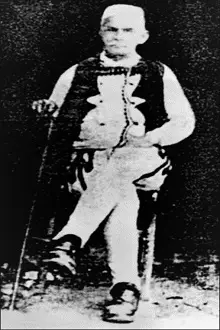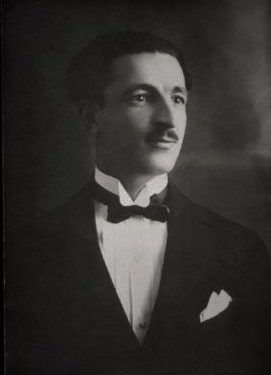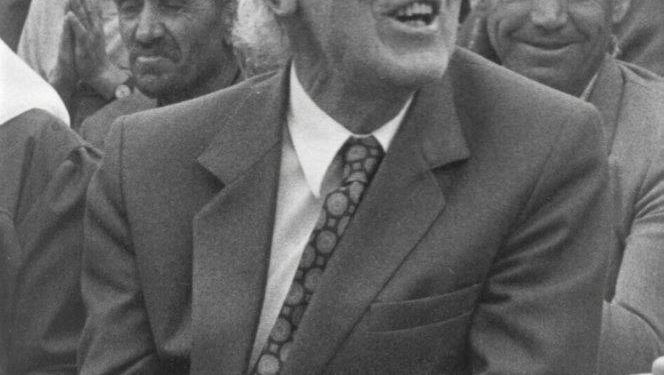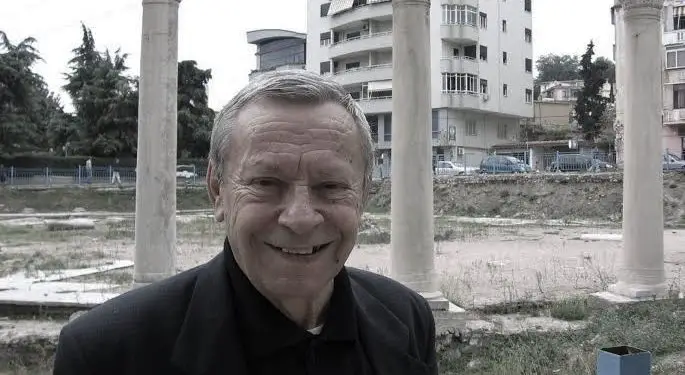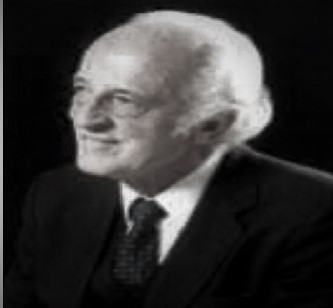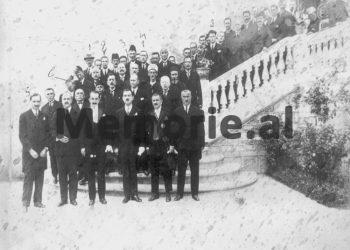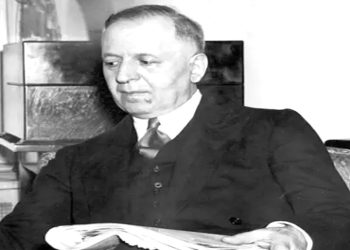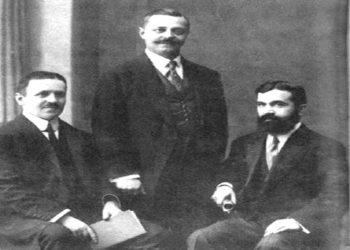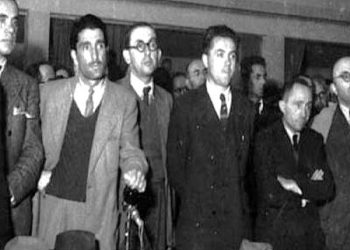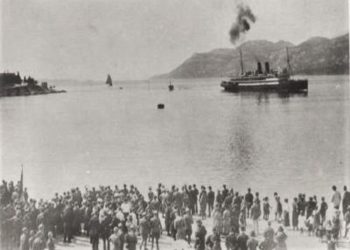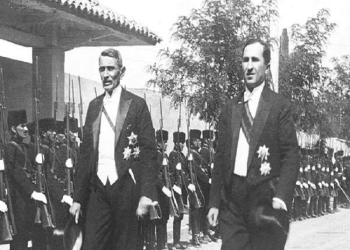From Xvehir Gradica
– Homage in honor of cardiologist Beniamin Çetta –
Memorie.al / The more the years go by, the more valuable the figures and names of some characters who have devoted themselves to the profession and society throughout their lives become. Such is Beniamin Çetta, whose name evokes respect and gratitude throughout Durrës. Cardiologist Çetta entered every home, sometimes as a doctor and sometimes as a character with rare social and humanitarian values. He lived in the difficult period of depersonalization of values. It tried punishment, imprisonment, terror, pressure, prison, deportation and has risen again with the same moral and social power. He never wanted to become a protagonist; he always served with wisdom and professionalism. In the life of Dr. Ben Chettes had difficult and dramatic years because of the unworthy punishment even though he was a devout believer and a free-thinking intellectual. Family education left a strong mark on the formation of character and personality.
Beni was the son of the intellectual Lazër Çetta, an official with indisputable social power and brother of Anton Çetta, chairman of the National Association for the Reconciliation of Blood in Kosovo and Mirdita. He was lucky enough to be the first educated and qualified cardiologist in Durrës and this gave him a great voice, while his humor and very frank relationships with colleagues made his name stand out among the white shirts.
Beniamin Çetta, apart from the educational culture, also received a special religious culture. Although religious preaching was prohibited and condemned during the communist regime, Dr. Cetta, would regularly receive religious lectures as well as attend festivals as a devout Christian. The ancient city of Durrës, among the events and stories, also preserves interesting and rare memories for Dr. Beniamin Chettan. Of course, within that story there are parts of pain and parts of pride. Both close to each other.
Who was Beniamin Cetta?
Beniamin Çetta was born in Tirana in March 1937. His father, Lazër Çetta, had the opportunity to receive Western culture and education and became a professor of the French language in a high school in Tirana, as well as director of the Directorate of Study Rights in Ministry of Education. The eldest son of the family, Antoni, finished the Korça High School, while Beniamini was going to study Medicine. At a very young age, he became an orphan, without a father, who died after a serious illness from which he did not escape even though he was sent abroad for treatment.
In such conditions, Benjamin and his mother moved from Tirana to Durrës, to his uncle’s house, an old urban family, while Antoni and his sister Manushe (brother and sister from another mother) went to live with their uncle. After completing his compulsory and secondary studies in Durrës, he continues his education at the Faculty of Medicine in Tirana. At the age of 23, Beniamini graduated and was appointed a doctor in Rrogozhinë, a city that was included under the medical care of Durrës at that time. There he will wear the doctor’s white shirt for the first time. He will stay in Rrogozhinë for only one year, since completing the qualification for a cardiologist, puts other demands on the specialized doctor.
Dr. Çetta was transferred and settled in Durrës, where he served as a cardiologist from 1961 to 1981. He, in this long period and especially in the first years of work, will have to cope with a very large volume of work. Until then, patients and citizens carried out visits and tests in Tirana, in terms of heart problems, while with the arrival of Ben Çetta, things took a different course. He is the first educated cardiologist and his dedication along with the seriousness in determining the diagnosis will make citizens turn their eyes to Dr. Chetta. His ties with Durrës will be inseparable throughout his life.
Visits to the polyclinic, ambulance, hospital and house to house. Night and day, without the slightest reward. Door to door throughout Durrës, at the service of the citizens. Due to the political punishment, he will stay away from the profession for several years, to return to the white shirts in 1986, but this time, away from the city where he was educated and served for 20 years, full of dedication and professionalism. The stop after the severe punishment will be in the village of Lekaj in Kavajë, where he will wait for the first days of the arrival of democracy in Albania. Kavaja was one of the foci of the outbreak of revolts in search of democracy and Dr. Çetta followed with great attention those developments of the first days of pluripartyism.
With retirement age approaching, in 1990 the cardiologist moved to the Durrës Polyclinic, where he will end his career filled with many stories, memories, emotions, pain and spiritual wounds. The years of retirement will be no less busy with work, even though everything will be programmed and implemented by itself. For 15 years of this period, he will remain, as well as in the years of his career, near patients and citizens. He will never give up on the cardiologist profession and will encourage young doctors to be as dedicated as possible. The latter, despite their qualifications and consultation with contemporary literature, never gave up their meetings with Dr. Çetta, from whom they learned many theoretical and practical things.
Culture
Beniamin Çetta was a name with special intellectual, professional and humanitarian power in the city of Durrës. Because of the religious culture, he learned the Italian language at a very young age and then diligently learns French. During the time he had made a prominent name as a good cardiologist, Dr. Ben, enters studies in his field. His peers remember that: Çetta stood out for his great will to read. He mainly browsed medical literature in Albanian and foreign languages, as well as literature, spending hours on the books without stopping, while the daily press, especially after the 1990s, would be an inevitable task.
In childhood and youth, he liked Literature and History very much. He had a desire, as he expressed himself, to study in one of them, but he obeys the will of his mother, who directs him to study Medicine. Among the most successful scientific studies for him, was: “Two cases of myocardial infarction with rupture of the interventricular septum” diagnosed during life and verified at necropsy. His personal library was among the richest in the city of Durrës. In it, medical literature, historical documents, national history texts, albums, dictionaries, books in foreign languages, poems, novels, etc. were systematized. Dr. Chetta used to spend a lot to buy books.
Shortly before he passed away, he left his library as a gift to the city’s public library, a special asset and considered intellectual weight. Because of the humane culture and feeling, he became a part of the team of the Italian humanitarian association, ‘Caritas’, and he cooperated a lot with the white shirts for the community of people with drug problems. His scientific range as well as his rich culture attracted the attention of the humanitarian association, which made him part of the team to help and take care of the health of people in need.
The name of Dr. Ben is engraved in the minds of all those who have known him, for his tireless contribution to, his tireless work for, the traces he left in Durrës medicine, as the first cardiologist from whom generations were born throughout the following decades. For the extraordinary sacrifices in the service of patients and citizens, Dr. Beniamin Çertta was declared “Honorary Citizen” of Durrës in 2008, while a year later; he passed away at the age of 72.
Arrest, punishment and persecution!
Beniamin Çetta would settle in Durrës at the age of 3, at a time when Albania had not yet been liberated. The loss of his father and the separation with his brother, Anton Çeta, will leave a strong mark on his formation. It grew with the weight of the goods of the partition which, unfortunately, was also accompanied by years of surveillance until the arrival of the year of political imprisonment.
Dr. Cheta was arrested in 1981 and sentenced to 10 years in prison, accused of “high social danger”. He had served 20 years as a cardiologist, saving dozens and hundreds of sick people from death, while his humanitarian act was ignored by the communist regime, which, after handcuffing him, sent him to prison in Bulqiza, Qafë-Bar and Zejmen.
His brother, Anton Çetta, was the initiator of blood reconciliation in Kosovo and this could not easily escape the UDB of the former Yugoslavia which, apart from police violence, tried to sow fratricide in Kosovo with everyone. On the other hand, Dr. Ben Cetta, as a devout Catholic, preached the religious faith even though such a thing was not only forbidden, but also very dangerous and punishable. The secret services (Albanian State Security and UDB, Yugoslavian) sacrificed both brothers, pushing them towards a life full of hard work and great sacrifices.
For the first time, the brothers Anton and Beniamin Çetta met in January 1968. Anton Çetta had come together with some of the prominent personalities of Kosovo, professors and well-known academics, such as: Idriz Ajeti, Syrja Popovci, Femi Agani and Mark Krasniqi, to participate in the celebrations of the 500th anniversary of the death of the National Hero, Gjergj Kastrioti, Skënderbeu. At the time he received the telegram, which said that his brother was at the “Dajti” hotel in Tirana, Ben Çetta was teaching Nursing.
The cardiologist is called by the head of the Internal Affairs Department, who knew Anton Çetta because they had been together at Korça High School. This was the first meeting after 20 years between the brothers who were burning with longing for separation. The second meeting between them will happen in 1990, when Dr. Ben Çetta gets a visa to go to Kosovo, a visa that he gets after long delays at the door of the embassy of the former Yugoslavia in Tirana. But even the Security of the Albanian State did not have a good eye on him and this would be proven in 1981, the arrest that caused indignation and silent revolt in all of Durrës.
The change in the political climate in Albania gave the brothers the opportunity to meet later, but only for a short time after, in 1994, Anton Çetta fell seriously ill in his lungs, giving him no hope for life. Dr. Beniamin Çetta will suffer a lot from the separation with his brother and for him; the only consolation in that period would be dedication to patients and books. Doctors even today remember the saying of Dr. Cetta, “Medicine needs mind, heart and feet”, synthesis of his professionalism and dedication throughout his life.
Testimonies of former colleagues and co-sufferers:
Dr. Dear Hoti:
Dr. I found Ben Cetta in the Durrës hospital, at the time I finished my studies in Medicine. He was the first specialized cardiologist in the city of Durrës. A foreign doctor, qualified for Cardiology, with five doctors. They belonged to the districts: Durrës, Shkodër, Korçë, Gjirokastër and Lushnje. Ben was one of them. At that time I was in the year of specialization and getting to know Dr. Ben gave me the opportunity to learn many things. He really liked learning foreign languages and studying. He adored Italian immensely, while communicating in French and other languages.
Çetta is a Mirdite family from the village of Xhuxhe. Even today in that village, there are toponyms that prove this. I remind you that in Djuxha, there is a mill called Mulliri i Chetta. From there, the family went to Gjakovë and returned to Tirana. Antoni, (Ben’s father’s brother), had studied at the Korça High School and French was his first foreign language there. Even his father, Lazëri, was a man of culture and education. He served as a French teacher and as director of scholarships at the Ministry of Education.
Dr. Ben was the cardiologist who looked all the sick in the eye, did not know the differentiation and experienced the discomfort and illness of the patient, whoever he was. He was a friend to everyone, including the black people who in Durrës were and are the majority. Humanism made it very popular. He communicated extremely well with us doctors. We adored him for his culture, dedication and characteristic and attractive humor. Since we were young, during the specialization period, he stayed by our side for several hours a day, giving us his experience and knowledge. It was dear, Benjamin.
After I became a doctor, he met me to cooperate systematically with Dr. Ben Chetta. I remember that there were five of us doctors, Ben among them, that every Wednesday, we traveled with the car of the Health Center to Shijak and every Saturday, to Kavaja, cities where we also had consultations. Doctor Beni had very strong ties with Tirana. Professor Ylli Popa, due to the personal consideration and professional respect he had for Ben, came from Tirana to see Ben’s patients and conducted highly qualified consultations with him.
Prof. Popa, had special sympathy for Dr. Ben and followed with admiring attention and care, the cards, the epicrisis, as well as the prescriptions issued by the Durrës cardiologist. Ben had the bad luck to suffer the harsh class struggle on his back. He was convicted and served imprisonment for political reasons. After the death of his father, Lazari, together with his mother, settled in Durrës with his uncle’s family. They were a typical Durrsak family and very old. Even though it was banned, they preached the religious faith as a family: mother, uncle, aunt and Beni himself.
The doctor himself was devoutly religious, regularly performed religious rites, of course in secret, preached and celebrated religious holidays. He especially celebrated St. Beniamin, who was even dearer to him. The regime imprisoned him in the most unjust way and Dr. Ben suffered many years in the infamous prisons of that regime.
Dr. Bashkim Habibi
In 1961, when I started working as an assistant doctor at the Xhafzotaj Agricultural Enterprise, I had the opportunity to meet Dr. Ben. The acquaintance took place in a work setting. One day I visited a patient and in my opinion, he was sick with bronchopneumonia. I sent him to Durrës hospital, the doctor on duty that day was Dr. Ben, that young doctor too. After examining the patient, he assessed the condition and admitted him to the hospital for treatment. After performing all the actions, at the end he asked the patient who it was that told him about hospitalization with this diagnosis.
When he told him that he was a young man, a medical assistant, who has just started working at Xhafzotaj Agricultural Enterprise, Dr. Ben, you said the nicest words to me, even though we had never met before. We did not know each other by name or physically. Then we became colleagues and worked at the Durrës hospital. From that time until he was alive, not only I, but all my colleagues, always had respect for him, appreciating him for his qualities as a talented cardiologist, and above all, he was appreciated by the people of Durrës, whose he came to his aid in every circumstance, day and night, with much love and selflessness.
Hysen Haxhia, former political convict
I met him in 1973 dr. Ben. My parents were sick and Ben used to come home to visit them. We became very good friends as he was calm and listened very attentively to his parents’ complaints about his illness. It was uncomplicated and very accurate in determining the diagnosis. He saved his life. Durrësi adored the doctor immensely. In 1976, I was arrested on charges of agitation and propaganda against the communist regime, and a year later, I was sent to Spaç. For the second time, I was arrested in 1981, and after being convicted of the same charge, from Ballshi to Qaf Bari, there was violence that he will never forget. There I learned that Ben Çetta had also been arrested.
I was very surprised and upset because the city had lost an irreplaceable doctor. As soon as we set foot on the territory of the camp, a list of 17 names is read, including me. They put us one by one into a room where seven policemen tortured us with pickaxes and shovels, whips and thick belts. After they had tortured me for a few minutes and I was waiting to go into the hands of the executioners for the second time, a policeman approached me and after he was convinced that I was Hysen Haxhia, he took me with him, taking me out of the torture room. From there to the camp ambulance. Upon entering, I see Dr. Ben. Upon meeting, we both burst into tears. He had seen me in line and begged the policeman to single me out. It saved me from inhuman torture.
Ben was the first cardiologist in Durrës and the whole city looked up to him. He never tired of serving. Durrës has rarely had a doctor of such humane proportions and skilled specialist, like Dr. Ben Cettan. We remember it often. Even the doctors, I heard, continue to appreciate his contribution. I was with the doctor until the minutes of separation from this life. We have lost a wonderful man and a great doctor. His name is worth honoring and respecting. It would be in the honor of medicine and big t-shirts that the cardiology department, which Ben founded himself, would bear his name as a sign of respect and gratitude for this great man.
Dr. Vladimir Tico
I have known Beniamin Çetta since early adolescence, but social and close ties with him came during the years of study at the Faculty of Medicine in Tirana. I started my studies in Medicine in September 1955. Ben was a second year student. Everyone knows him as a cultured and erudite guy. He had passion and willingness to read literature, history, classical music, visual arts. For the first time I heard from Ben Cetta what classical music is. Our bodies shuddered when we heard Ben sing.
We were poor, but we regularly attended movies and dramas in cinemas and theaters. We also followed the operas, and this was due to Ben’s insistence. The few lek we could save, we used to buy a ticket. Suffice it to say that we have seen “Travjata” together with Ben 35 times and this shows what passion he had for art and how influential he was on us. My friend and good friend, he had special and high values for loyalty to anyone. I have spent many beautiful moments with Ben, many of which are private and I never wanted to make them public. I remember how one day, after they were in our mood, we left the building and went somewhere to have fun.
Exalted and full of humor as he was in nature, Beni turns to me and without considering that there were many people around us, he says: “You Lad Tiço are the biggest democrat”. I was expelled from the Faculty of Medicine, because of my extreme political opinions, and I was forced to work in Kurvelesh. After numerous interventions, I returned to the university. Ben’s statements were very honest. He never spoke in subtext or gossiped about anyone. I am one of Ben’s closest friends, so I have known him closely and very well for years and years, from the time of higher studies until the day he passed away. This gives me the right to say that Ben was very special.
He was unjustly convicted and imprisoned in the most unworthy manner. Never and for no moment did Ben speak or even think of raising his voice against the politics of that regime. The trial was an unjust punishment, however, Ben never backbited or showed the slightest inclination to expose those who imprisoned him. His life is very interesting, but I would single out from the years of knowing him, his professional ability as a doctor, his unparalleled humanity and his passion for reading. Memorie.al




